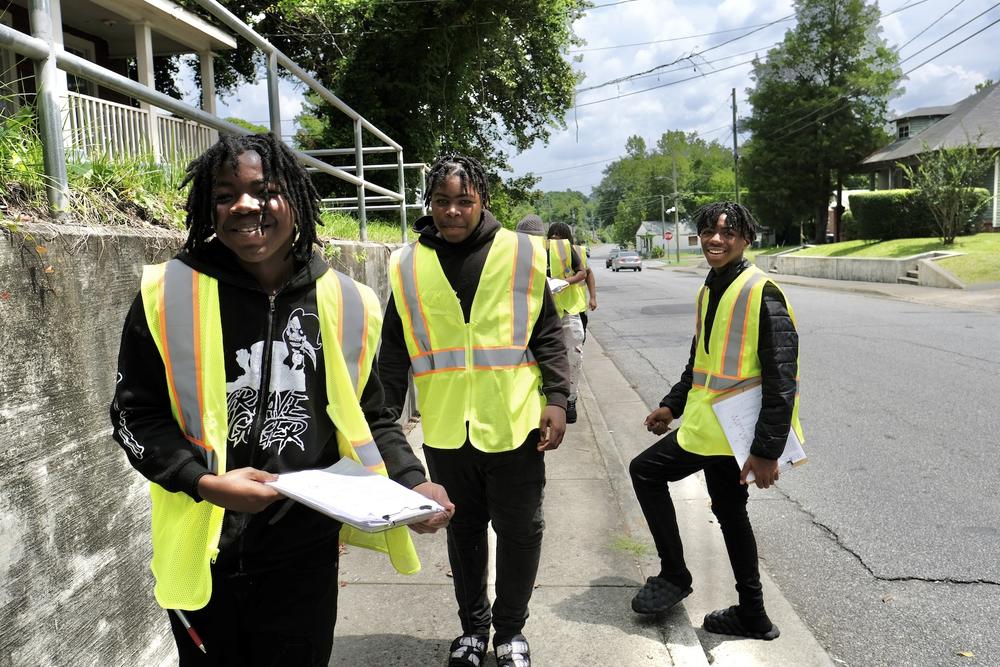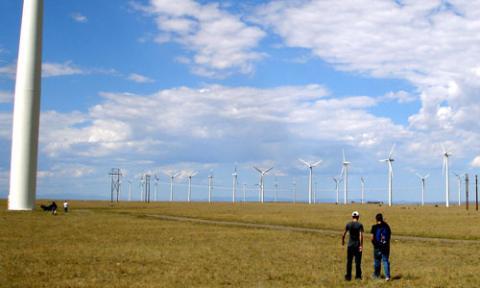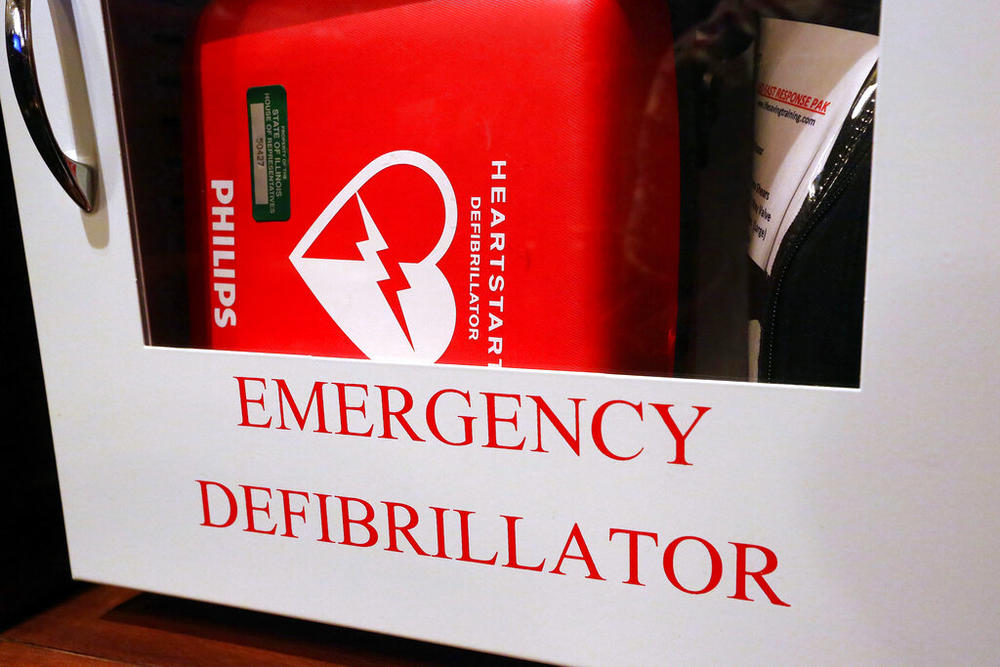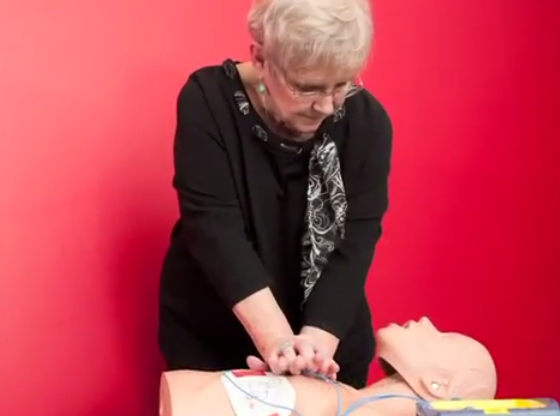
Section Branding
Header Content
Georgia Today: Macon neighborhood safety; Georgia ranks high for clean energy; Heat safety for young athletes
Primary Content
On the Friday, July 28 edition of Georgia Today: The city of Macon looks to increase neighborhood safety with a project spearheaded by young people; Georgia ranks among the top states for economic development for clean energy; And a look at how the summer heat will affect young athletes as they head back to the practice field.

Orlando Montoya: Hello and welcome to the Georgia Today podcast from GPB News. Today is Friday, July 28. I'm Orlando Montoya. On today's episode, the city of Macon looks to increase neighborhood safety with a project spearheaded by young people. Georgia ranks among the top states for economic development, for clean energy; and a look at how the summer heat will affect young athletes as they head back to the practice field. These stories and more are coming up on this edition of Georgia Today.
Story 1:
Orlando Montoya: Many people are looking for ways to slow the pace of violence in their communities. In Macon, a project that started this summer, is looking at improving the physical appearance of seniors' homes. Their young people in the community make repairs, reducing the gap of misunderstanding between two generations and hopefully making life safer for the people most likely to be the victims of violence, the young people themselves. GPB's Eliza Moore has the story.
Eliza Moore: It’s a rainy day in the historic Pleasant Hill neighborhood, and Sherman Kind is showing me around the area he’s loved since he was a kid.
Sherman Kind: Oh, this neighborhood is beautiful.
Eliza Moore: Pleasant Hill was founded by Black professionals after the Civil War who couldn’t get housing in other areas of the community. The neighborhood thrived until Interstate 75 was built through its heart. This brought blight that Kind says has changed the landscape.
Sherman Kind: Just imagine if every house you see is abandoned and just raggedy. And what kind of sense of community would that give you? It'd make you feel like your community was worthless. So why would you care about anything worthless? It don’t matter.
Eliza Moore: That’s why Kind is helping to do repairs on senior homes. He points to a yellow house almost invisible behind the tree line.
Sherman Kind: It looks like nobody lives in that house.
Eliza Moore: It turns out, someone does. Amanda White has lived in Pleasant Hill her whole life. She tells me her brother lives in that house.
Amanda White: He's a veteran and he's had three strokes, but he couldn't hardly get around, but he still lives there but the house 'bout to fall in.

Eliza Moore: Amanda’s brother is one of many senior residents whose homes will receive renovations this year.
Amanda White: What the United Way is doing for the elders, I think that's good because a lot of elder people don't feel comfortable anymore even living in the neighborhood. They just stay shut up in their houses and stuff.
Eliza Moore: The project repairing her brother’s home and where Sherman Kind is working is called Safe by Design. The idea behind the grant-funded program is that, by physically repairing the neighborhood, it will be less susceptible to crime and violence, an urban planning strategy called Crime Prevention Through Environmental Design. For the first phase in June, United Way of Central Georgia brought in volunteers like Frank Dixon to conduct safety surveys of the neighborhood. Dixon works with Sherman Kind in another program, Cure Violence Macon, a nonprofit working to decrease gun violence. He says Safe by Design will install:
Frank Dixon: Flood lights on each side, the doorbell. Oh, and the peephole and the reflective lighting. Those four things will make a house safer.
Eliza Moore: For the second phase of the project, Dixon has enlisted a group of local boys in their early teens that he mentors to help fix up the seniors' houses. They’re excited to help their neighborhood.
Boys (in house) Fixing: We are really excited to fix those up. What we saw was we had a big… So. Yeah. These are houses built here. Yeah. I could be like grandad.
Eliza Moore: Like Naiem Moore, they’ve grown up here.
Naiem: What I love about my neighborhood is, it’s peace to me, and really, at peace, [a] good environment.
Eliza Moore: In this city where homicides average around one a week, oftentimes those who are killed are only a few years older then these boys. Dixon wants to change this. He says change can happen when the boys learn to care for their community through relationships with their elders. And then those relationships make seniors less afraid of young people.
Frank Dixon: Hopefully these kids become adopted grandkids for these elderly and these relationships go past the initial work. It’s not rocket science. It's like we are just reestablishing our culture as a vibrant, historic community and I think they see this as sacred ground.
Eliza Moore: If not sacred, at least a place they want to protect. United Way plans to expand the project to other neighborhoods in Macon in the coming months. For GPB news, I’m Eliza Moore in Macon.
Story 2:
Orlando Montoya: One of the two medical cannabis manufacturing companies that so far have been awarded licenses to operate in Georgia has opened its first dispensary. Botanical Sciences held dedication ceremony for the facility in Pooler near Savannah on Wednesday. The company began growing marijuana and converting the crop into low-THC oil at a plant in Glenville earlier this year. State lawmakers passed a law in 2019 to legalize medical marijuana under close supervision to treat various ailments.

Story 3:
Orlando Montoya: Georgia ranks among the top states for economic development around clean energy. That's according to a new report by an advocacy group for green power. GPB's Benjamin Payne reports.
Benjamin Payne: Twenty-two clean energy projects were announced in Georgia within the last year, second only to Michigan. So says the group Climate Power, which analyzed data ahead of the one-year anniversary of the Inflation Reduction Act. Savannah Mayor Van Johnson is applauding that bill as a game-changer for clean energy investment in Southeast Georgia, where Hyundai plans to use the law's tax credits at a future EV plant in Bryan County.
Van Johnson: The Inflation Reduction Act is uplifting the middle class here in Georgia. We can't be the best place in the country in which to do business, as our governor often likes to say, but at the end of the day not be the place that is harnessing the green energy opportunities that that provides.
Benjamin Payne: Georgia also ranked second-highest in the number of new clean energy jobs, at over 16,000. For GPB News, I'm Benjamin Payne.
Story 4:
Orlando Montoya: An Arizona man has been sentenced to nearly three years in prison for recruiting a former friend to claim falsely that he witnessed a sexual assault by a former Georgia Tech basketball coach. Ronald Bell pleaded guilty in the case earlier this year. He and two others conspired falsely to accuse the coach and demand money from Georgia Tech in exchange for not reporting the fictional assault.

Story 5:
Orlando Montoya: With Georgia students heading back to the classroom in these summer weeks, many also will head outside to practice sports with summer heat posing a serious risk. Georgia high school coaches are well aware that no one, not even young and seemingly healthy athletes, is immune from extreme temperatures. Jon Nelson of GPB Sports tells us how these coaches and administrators are working to keep students safe.
Jon Nelson: Around the state, outdoor treatments vary from start times in the early morning to early evening. But the key, according to GMC Prep head coach Bobby Rhoades, in a city like Milledgeville, is knowing your student athletes.
Bobby Rhoades: That's something we take very seriously. We stay on top of it. That's one of the main things I monitor throughout the course of practice is looking for signs of heat-related illnesses so we can act on it really quickly.
Jon Nelson: Several school systems around the state have gone to the lengths of building indoor training facilities. One of those is at Lowndes High in Valdosta. Athletic director Danny Redshaw says it was built for more than just football in mind.
Danny Redshaw: Now, you know, football does use it and there is a football field there, but it is schoolwide as far as the availability of that thing to use. And it is — we are very fortunate to have it.
Jon Nelson: Director for the 400-plus member Georgia Bridgeman Band, John Bowman is thankful his team has a base of operations to train as well.
John Bowman: We're in camp right now. Since last week we were able to go in there at 1:00. I mean, we're normally inside during that time of the day, you know, getting stuff done. But we were able to go in there and work out some problems and just to be able to still get rehearsals in with them when the weather sets in,.
Jon Nelson: Let the games begin as all the schools around the state try to hit the right notes in 2023. Jon Nelson, GPB News.
Story 6:
Orlando Montoya: Bronny James, the eldest son of NBA all-time great LeBron James, suffered a cardiac arrest on Monday while working out with his new teammates at the University of Southern California in Los Angeles. And earlier this year here in Georgia, a Merthyr soccer player died from cardiac arrest while playing a pickup game. The condition is not unheard of. In fact, it's the leading cause of death in young athletes. Dr. Michael Ackerman with the Mayo Clinic joins me now to talk about cardiac arrest as student athletes return to practice all over Georgia. Thanks for joining me, Dr. Ackerman.
Dr. Michael Ackerman: Thanks for having me. Great to be with you.
Orlando Montoya: When we think about student athletes and athletes in general, we're thinking about people at the top of their physical game. So how do these players suffer from cardiac arrest?
Dr. Michael Ackerman: Well, I think it's important that it's not just athletes. It's really if you are alive and healthy, all of us have a chance of experiencing sudden cardiac arrest. So there's this background, low, low chance. And but we know that in college and in certain sports and in certain types of athletes, men versus women, white versus Black, the numbers are not the same for everybody. So it may be 1 in 80,000 for all athletes and probably all humans who are on college campuses. But it can get as high as 1 in 4,000, 1 in 5,000 chance per year if you are a Black male playing Division-1 university basketball. So it's not a one-size-fits-all risk and it's not just the athlete.

Orlando Montoya: What are the warning signs of cardiac arrest?
Dr. Michael Ackerman: Well, sudden cardiac arrest or SCA, by definition, is a near instantaneous faint, followed by not waking up on your own within 10 seconds — meaning you faint, you suddenly collapse. You're not waking up. You now need activation of the emergency action plan: Call 911. Push chest compressions fast and get that external defibrillator. Apply it and deliver the shock if instructed to do so. That's sudden cardiac arrest. And in many people, there are no warning signs for that particular moment in which the collapse happens. Now, there could be a warning sign that might have happened in that person two years ago. They might have had an exercise-triggered faint, and they woke up 10 seconds later on their own. So and if that went unrecognized and unevaluated, then the next episode may be far more dramatic than just self-limiting faint. So somebody who's had a sudden, out-of-the-blue exercise-triggered faint, that's not just a warning sign of a faint. That's a warning sign for the possible future sudden cardiac arrest.
Orlando Montoya: What can schools and coaches do to increase safety to make it safer for student athletes?
Dr. Michael Ackerman: Oh, I think it's really starts with awareness and readiness. You know, an ounce of prevention is a pound of cure. And so you're starting to see what I call sudden death safety nets being set up everywhere. So if you don't know of an athlete or an artist or an academic health status because they've had no warning signs and maybe a screening program would or would not detect them, then what you want to do is that if anybody collapses on campus, whether it's the student-athlete, the academic student or the custodian, that whoever collapses, wherever they collapse, there would be an emergency action plan readied and activated and rehearsed. Those programs that have it in place — casinos do an amazing job; it's hard to die suddenly in casinos because they have an action plan. No matter how much money you lose, it's hard to die suddenly in an airplane or an airport because they have the AED plan readied and in place. So having — making it hard to die suddenly in your community, in the public square, is one of our best strategies for the unknown event. The other is finding those who are at risk, getting them treated effectively so that that safety plan will never need to be executed for that person because you know about them.
Orlando Montoya: Are we seeing an increase in cardiac events for kids? And what, if any, role does COVID-19 or long COVID play?
Dr. Michael Ackerman: Yeah, great question. You know, the COVID and the vaccine for COVID is being linked to everything. And I think this has been utterly irresponsible with respect to young people dying suddenly as if they're dropping like flies left and right because of the jab — it's absolute nonsense. It's actually quite cruel from my standpoint for that messaging, because in our program at Mayo Clinic, I've been taking care of sudden cardiac arrest survivors for decades now, long before this thing called SARS-CoV-2 even existed, and long before there was a thing called the vaccine for it. And in those who are genetically predilected, there should have been more episodes happening left and right, because my patients are already primed for an electrical episode. And yet we saw absolutely zero — ZERO — increase in events in the three years of the epidemic, pandemic, and in the three years before it. No difference. So, you know, the virus and the vaccine might get credit or blame for some things, but it deserves neither credit or blame for these sudden cardiac arrests from my vantage point.
Orlando Montoya: And before I let you go, just to change the subject a little bit to heatstroke: I know a lot of parents and coaches are concerned about that. What are some warning signs that people should be looking for on heatstroke?
Dr. Michael Ackerman: All healthy people should be staying well-hydrated if they're out on 80-degree, 90-degree, 100-degree days. All healthy people should be doing 80 to 120 ounces, if possible, of noncaffeinated, nonalcoholic beverages like water. Important in the summer. Two-a-day — football two-a-days that will start happening in Southeast United States and other places. It's just really important to stay hydrated. But people shouldn't be scared that the heat will trigger a sudden cardiac arrest. That's incredibly rare.
Orlando Montoya: Thank you so much for joining me, Dr. Ackerman.
Dr. Michael Ackerman: Great to be with you. And thanks for doing this.

Story 7:
Orlando Montoya: Georgia's attorney general has signed off on a planned partnership between Wellstar and Augusta University Health Systems. A report, released yesterday by the Office of Attorney General Chris Carr, is a key step in a merger announced last year. The partnership will expand the university's health sciences training and research across the state and commit Wellstar to nearly $800 million in capital projects over the next decade. Some state lawmakers have questioned the plan after Wellstar closed two hospitals in the Atlanta area last year.
Story 8:
Orlando Montoya: Medicaid and Medicare turn 58 years old this weekend. GPB's Donna Lowry reports here in Georgia, the programs remain as politically polarizing as ever.
Donna Lowry: According to the National Archives, in July 1965, debates over health coverage dominated politics, leading President Lyndon B Johnson to sign Medicaid and Medicare into law. Today, Georgia remains one of 10 states that hasn't fully expanded Medicaid. And that angers state Democrats like Senate Minority Leader Gloria Butler.
Gloria Butler: That would provide health coverage for nearly 450,000 Georgians. Not to mention create thousands of jobs and help struggling hospitals.
Donna Lowry: While Gov. Brian Kemp agrees more Georgians need health insurance, he contends full Medicaid expansion would become too costly and restrictive long term. This month, he instituted an alternative program that insures more people but has a work requirement. Donna Lowry for GPB News.
Story 9:
Orlando Montoya: The Georgia Lottery announced yesterday that it raised more than one and a half billion dollars for education during the fiscal year that ended in June. It's the eighth consecutive year the lottery surpassed the billion-dollar mark in profits for education.
Story 10:
Orlando Montoya: The Macon Film Festival announced this week their inaugural Georgia Film Impact Award will go to Dallas Austin. The Grammy Award winner, film and music producer and Columbus native is behind films like ATL and Drumline. The film festival will host a special screening of Drumline at the Grand Opera House on Aug. 19 at 7:15 p.m.. The film festival runs from Aug. 17 through the 20th.
And that's it for today's edition of Georgia Today. I'd like to remind you that many of the stories that you hear on this podcast are available on our website, GPB.org/news. The website also has lots of stories that aren't on the podcast; stories that are just for the written word. So check out GPB.org/news. Send us your feedback about Georgia Today to GeorgiaToday@GPB.org, and hit subscribe on this podcast so you always stay current with us in your feed. I'm Orlando Montoya. It's been a fun seven days filling in for Peter Biello, who is off on a well-deserved vacation. He'll be back next week. In the meantime, you have a great weekend.
---
For more on these stories and more, go to GPB.org/news



